Comparative Analysis of Leadership and Management at Corus Steel
VerifiedAdded on 2021/02/21
|14
|3907
|48
Report
AI Summary
This report provides a comprehensive analysis of leadership and management principles, focusing on the context of Corus Steel Company. It begins by comparing the roles and characteristics of leaders and managers, highlighting their differences in vision, risk-taking, focus, aims, and decision-making. The report then applies these concepts to situational contexts, such as technological changes and labor turnover, demonstrating how leaders and managers adapt to these challenges. Furthermore, it explores various leadership theories and models, including situational leadership and system leadership, and their practical applications within the organization. The report also examines different management approaches to operational management, such as Total Quality Management (TQM), and the functions of leaders and managers in these contexts, emphasizing the significance of operational management in achieving business goals. Finally, the report touches upon factors impacting operational management and the authoritative abilities of managers and leaders. This report, contributed by a student and available on Desklib, offers valuable insights into leadership and management practices within a major steel company.
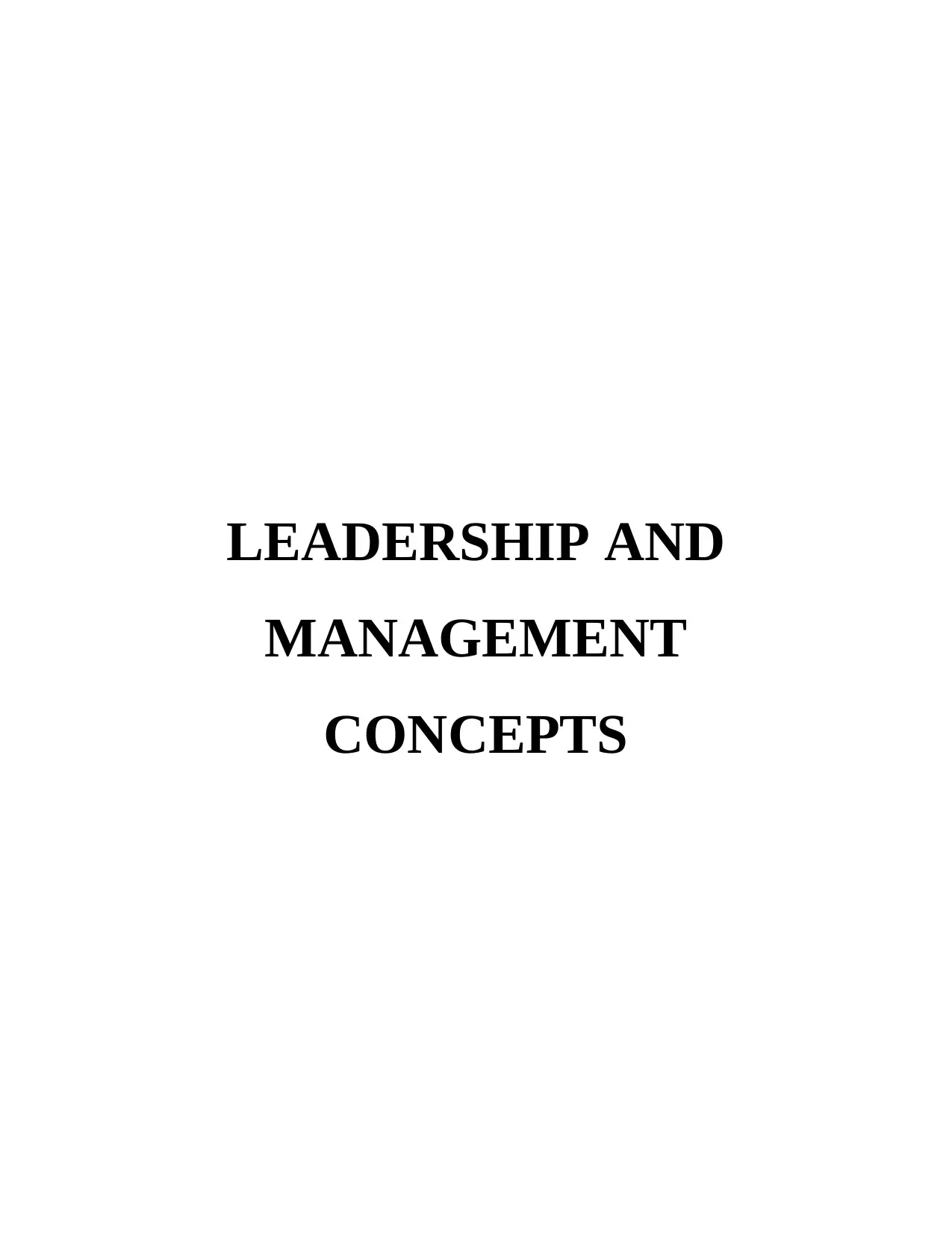
LEADERSHIP AND
MANAGEMENT
CONCEPTS
MANAGEMENT
CONCEPTS
Paraphrase This Document
Need a fresh take? Get an instant paraphrase of this document with our AI Paraphraser
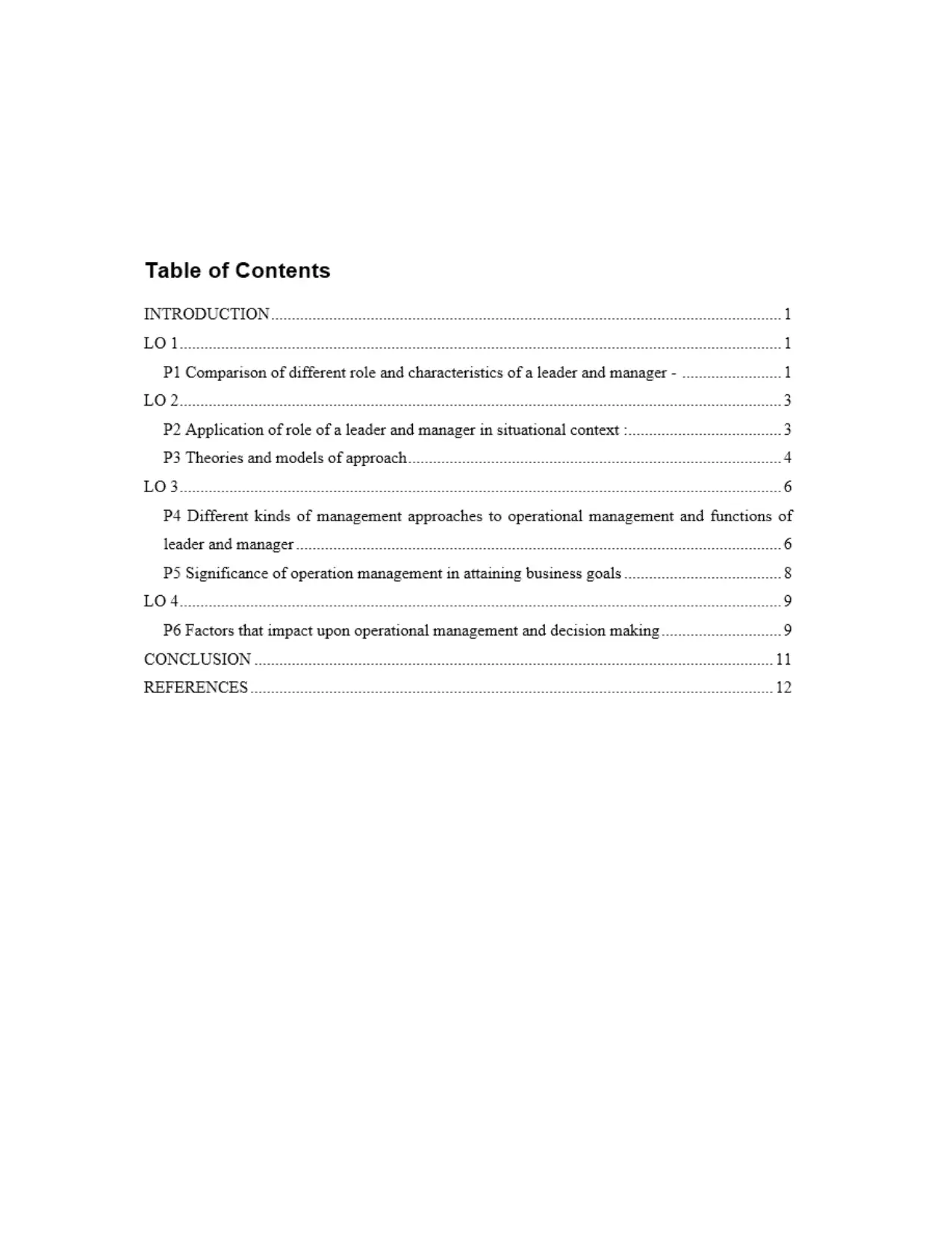
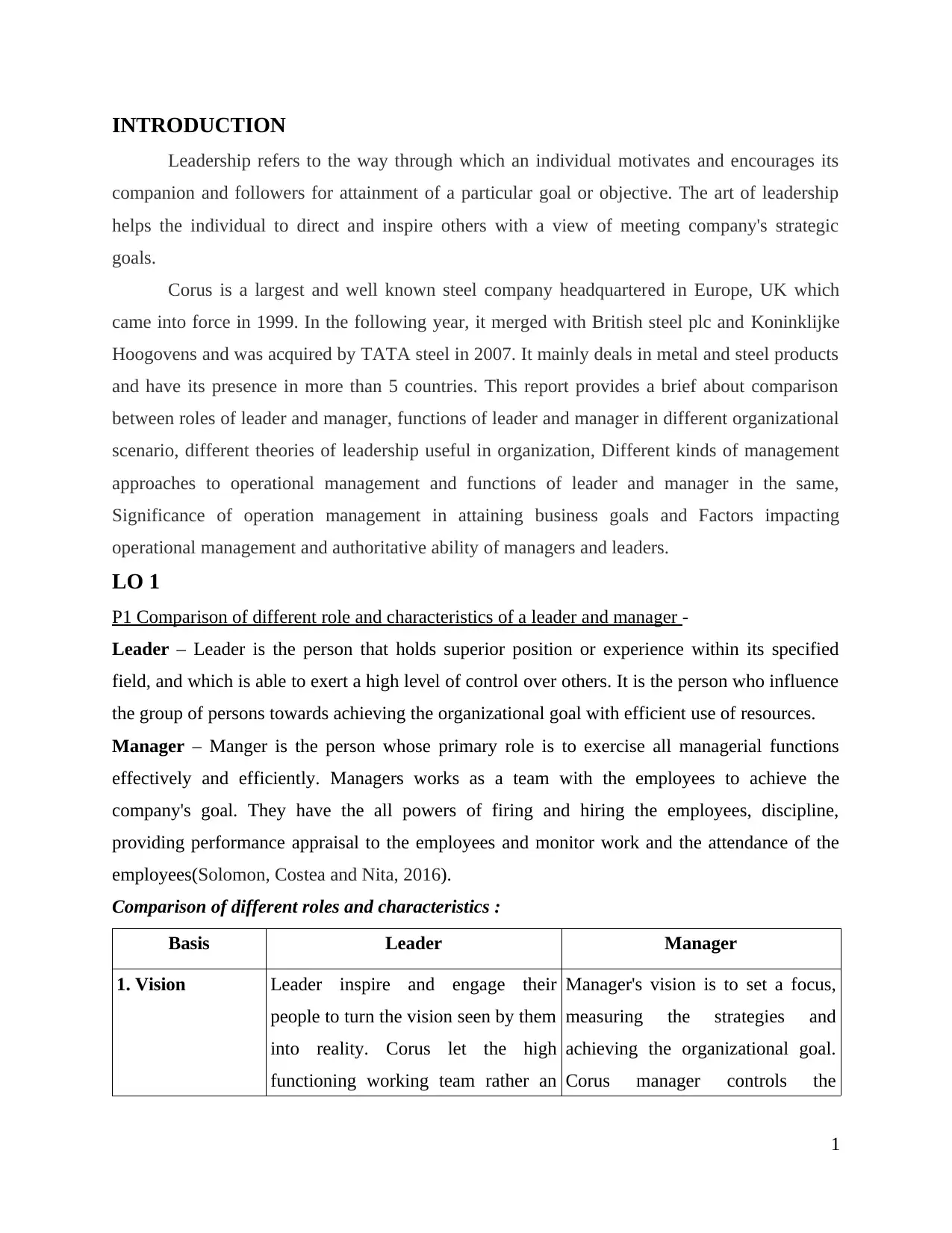
INTRODUCTION
Leadership refers to the way through which an individual motivates and encourages its
companion and followers for attainment of a particular goal or objective. The art of leadership
helps the individual to direct and inspire others with a view of meeting company's strategic
goals.
Corus is a largest and well known steel company headquartered in Europe, UK which
came into force in 1999. In the following year, it merged with British steel plc and Koninklijke
Hoogovens and was acquired by TATA steel in 2007. It mainly deals in metal and steel products
and have its presence in more than 5 countries. This report provides a brief about comparison
between roles of leader and manager, functions of leader and manager in different organizational
scenario, different theories of leadership useful in organization, Different kinds of management
approaches to operational management and functions of leader and manager in the same,
Significance of operation management in attaining business goals and Factors impacting
operational management and authoritative ability of managers and leaders.
LO 1
P1 Comparison of different role and characteristics of a leader and manager -
Leader – Leader is the person that holds superior position or experience within its specified
field, and which is able to exert a high level of control over others. It is the person who influence
the group of persons towards achieving the organizational goal with efficient use of resources.
Manager – Manger is the person whose primary role is to exercise all managerial functions
effectively and efficiently. Managers works as a team with the employees to achieve the
company's goal. They have the all powers of firing and hiring the employees, discipline,
providing performance appraisal to the employees and monitor work and the attendance of the
employees(Solomon, Costea and Nita, 2016).
Comparison of different roles and characteristics :
Basis Leader Manager
1. Vision Leader inspire and engage their
people to turn the vision seen by them
into reality. Corus let the high
functioning working team rather an
Manager's vision is to set a focus,
measuring the strategies and
achieving the organizational goal.
Corus manager controls the
1
Leadership refers to the way through which an individual motivates and encourages its
companion and followers for attainment of a particular goal or objective. The art of leadership
helps the individual to direct and inspire others with a view of meeting company's strategic
goals.
Corus is a largest and well known steel company headquartered in Europe, UK which
came into force in 1999. In the following year, it merged with British steel plc and Koninklijke
Hoogovens and was acquired by TATA steel in 2007. It mainly deals in metal and steel products
and have its presence in more than 5 countries. This report provides a brief about comparison
between roles of leader and manager, functions of leader and manager in different organizational
scenario, different theories of leadership useful in organization, Different kinds of management
approaches to operational management and functions of leader and manager in the same,
Significance of operation management in attaining business goals and Factors impacting
operational management and authoritative ability of managers and leaders.
LO 1
P1 Comparison of different role and characteristics of a leader and manager -
Leader – Leader is the person that holds superior position or experience within its specified
field, and which is able to exert a high level of control over others. It is the person who influence
the group of persons towards achieving the organizational goal with efficient use of resources.
Manager – Manger is the person whose primary role is to exercise all managerial functions
effectively and efficiently. Managers works as a team with the employees to achieve the
company's goal. They have the all powers of firing and hiring the employees, discipline,
providing performance appraisal to the employees and monitor work and the attendance of the
employees(Solomon, Costea and Nita, 2016).
Comparison of different roles and characteristics :
Basis Leader Manager
1. Vision Leader inspire and engage their
people to turn the vision seen by them
into reality. Corus let the high
functioning working team rather an
Manager's vision is to set a focus,
measuring the strategies and
achieving the organizational goal.
Corus manager controls the
1
⊘ This is a preview!⊘
Do you want full access?
Subscribe today to unlock all pages.

Trusted by 1+ million students worldwide
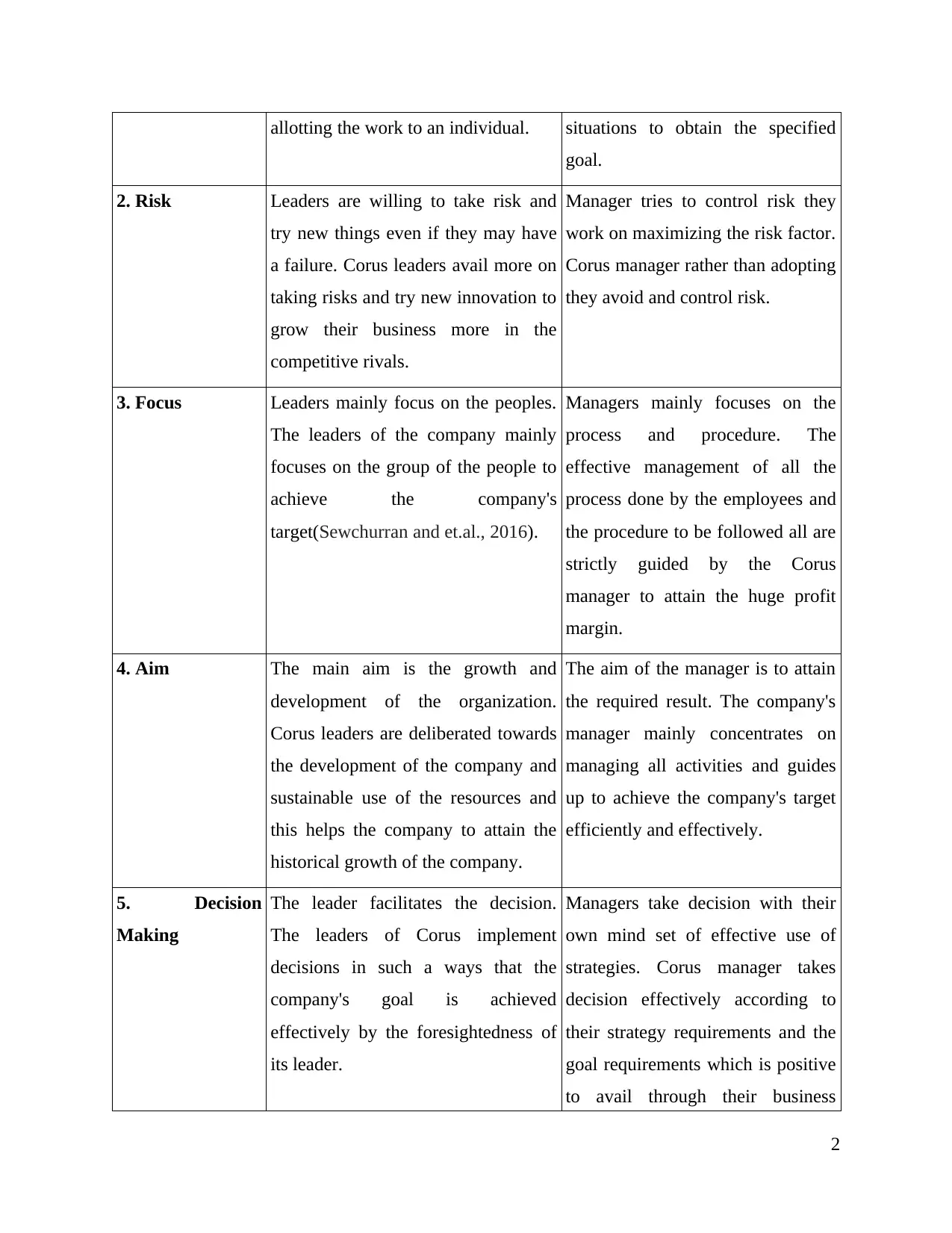
allotting the work to an individual. situations to obtain the specified
goal.
2. Risk Leaders are willing to take risk and
try new things even if they may have
a failure. Corus leaders avail more on
taking risks and try new innovation to
grow their business more in the
competitive rivals.
Manager tries to control risk they
work on maximizing the risk factor.
Corus manager rather than adopting
they avoid and control risk.
3. Focus Leaders mainly focus on the peoples.
The leaders of the company mainly
focuses on the group of the people to
achieve the company's
target(Sewchurran and et.al., 2016).
Managers mainly focuses on the
process and procedure. The
effective management of all the
process done by the employees and
the procedure to be followed all are
strictly guided by the Corus
manager to attain the huge profit
margin.
4. Aim The main aim is the growth and
development of the organization.
Corus leaders are deliberated towards
the development of the company and
sustainable use of the resources and
this helps the company to attain the
historical growth of the company.
The aim of the manager is to attain
the required result. The company's
manager mainly concentrates on
managing all activities and guides
up to achieve the company's target
efficiently and effectively.
5. Decision
Making
The leader facilitates the decision.
The leaders of Corus implement
decisions in such a ways that the
company's goal is achieved
effectively by the foresightedness of
its leader.
Managers take decision with their
own mind set of effective use of
strategies. Corus manager takes
decision effectively according to
their strategy requirements and the
goal requirements which is positive
to avail through their business
2
goal.
2. Risk Leaders are willing to take risk and
try new things even if they may have
a failure. Corus leaders avail more on
taking risks and try new innovation to
grow their business more in the
competitive rivals.
Manager tries to control risk they
work on maximizing the risk factor.
Corus manager rather than adopting
they avoid and control risk.
3. Focus Leaders mainly focus on the peoples.
The leaders of the company mainly
focuses on the group of the people to
achieve the company's
target(Sewchurran and et.al., 2016).
Managers mainly focuses on the
process and procedure. The
effective management of all the
process done by the employees and
the procedure to be followed all are
strictly guided by the Corus
manager to attain the huge profit
margin.
4. Aim The main aim is the growth and
development of the organization.
Corus leaders are deliberated towards
the development of the company and
sustainable use of the resources and
this helps the company to attain the
historical growth of the company.
The aim of the manager is to attain
the required result. The company's
manager mainly concentrates on
managing all activities and guides
up to achieve the company's target
efficiently and effectively.
5. Decision
Making
The leader facilitates the decision.
The leaders of Corus implement
decisions in such a ways that the
company's goal is achieved
effectively by the foresightedness of
its leader.
Managers take decision with their
own mind set of effective use of
strategies. Corus manager takes
decision effectively according to
their strategy requirements and the
goal requirements which is positive
to avail through their business
2
Paraphrase This Document
Need a fresh take? Get an instant paraphrase of this document with our AI Paraphraser
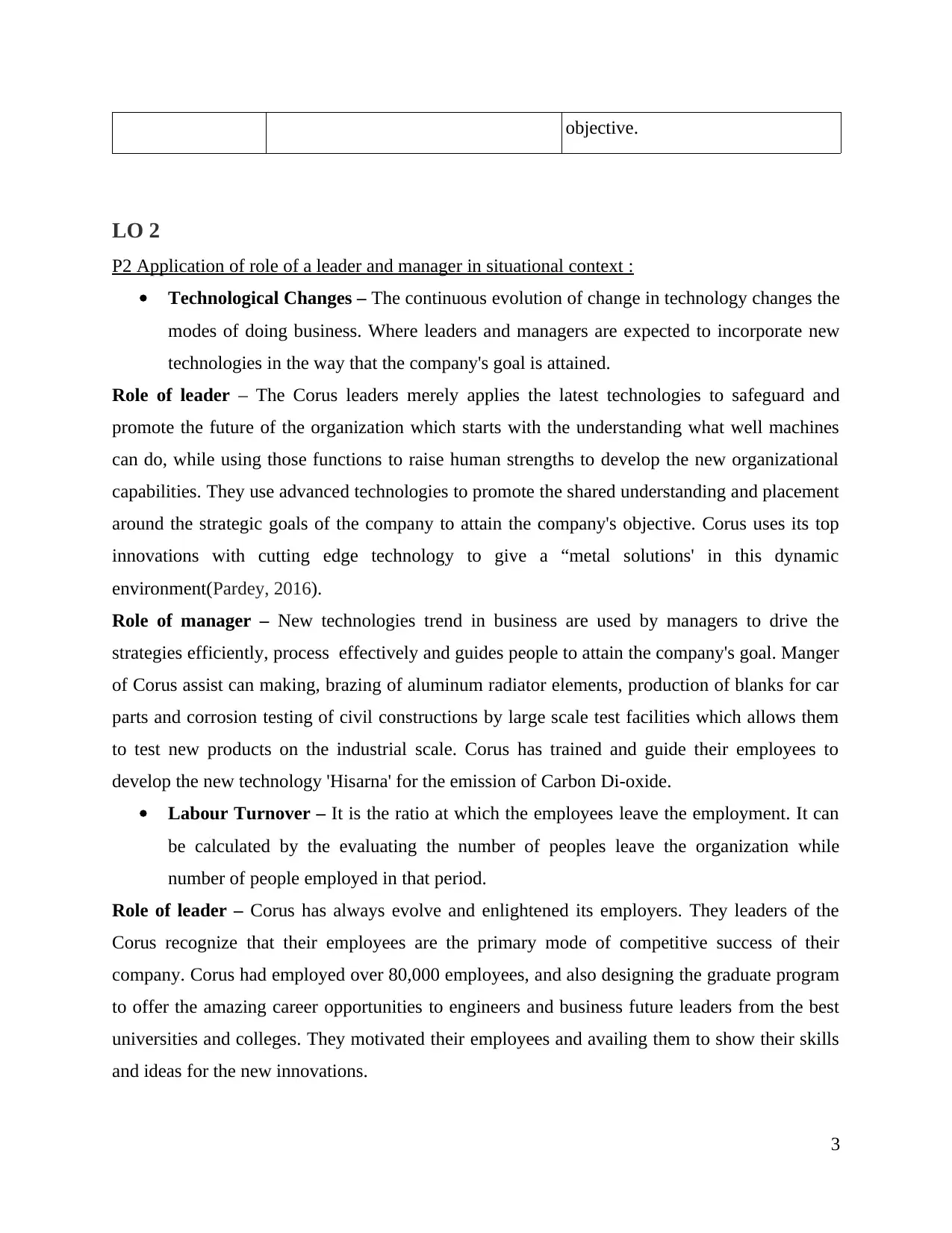
objective.
LO 2
P2 Application of role of a leader and manager in situational context :
Technological Changes – The continuous evolution of change in technology changes the
modes of doing business. Where leaders and managers are expected to incorporate new
technologies in the way that the company's goal is attained.
Role of leader – The Corus leaders merely applies the latest technologies to safeguard and
promote the future of the organization which starts with the understanding what well machines
can do, while using those functions to raise human strengths to develop the new organizational
capabilities. They use advanced technologies to promote the shared understanding and placement
around the strategic goals of the company to attain the company's objective. Corus uses its top
innovations with cutting edge technology to give a “metal solutions' in this dynamic
environment(Pardey, 2016).
Role of manager – New technologies trend in business are used by managers to drive the
strategies efficiently, process effectively and guides people to attain the company's goal. Manger
of Corus assist can making, brazing of aluminum radiator elements, production of blanks for car
parts and corrosion testing of civil constructions by large scale test facilities which allows them
to test new products on the industrial scale. Corus has trained and guide their employees to
develop the new technology 'Hisarna' for the emission of Carbon Di-oxide.
Labour Turnover – It is the ratio at which the employees leave the employment. It can
be calculated by the evaluating the number of peoples leave the organization while
number of people employed in that period.
Role of leader – Corus has always evolve and enlightened its employers. They leaders of the
Corus recognize that their employees are the primary mode of competitive success of their
company. Corus had employed over 80,000 employees, and also designing the graduate program
to offer the amazing career opportunities to engineers and business future leaders from the best
universities and colleges. They motivated their employees and availing them to show their skills
and ideas for the new innovations.
3
LO 2
P2 Application of role of a leader and manager in situational context :
Technological Changes – The continuous evolution of change in technology changes the
modes of doing business. Where leaders and managers are expected to incorporate new
technologies in the way that the company's goal is attained.
Role of leader – The Corus leaders merely applies the latest technologies to safeguard and
promote the future of the organization which starts with the understanding what well machines
can do, while using those functions to raise human strengths to develop the new organizational
capabilities. They use advanced technologies to promote the shared understanding and placement
around the strategic goals of the company to attain the company's objective. Corus uses its top
innovations with cutting edge technology to give a “metal solutions' in this dynamic
environment(Pardey, 2016).
Role of manager – New technologies trend in business are used by managers to drive the
strategies efficiently, process effectively and guides people to attain the company's goal. Manger
of Corus assist can making, brazing of aluminum radiator elements, production of blanks for car
parts and corrosion testing of civil constructions by large scale test facilities which allows them
to test new products on the industrial scale. Corus has trained and guide their employees to
develop the new technology 'Hisarna' for the emission of Carbon Di-oxide.
Labour Turnover – It is the ratio at which the employees leave the employment. It can
be calculated by the evaluating the number of peoples leave the organization while
number of people employed in that period.
Role of leader – Corus has always evolve and enlightened its employers. They leaders of the
Corus recognize that their employees are the primary mode of competitive success of their
company. Corus had employed over 80,000 employees, and also designing the graduate program
to offer the amazing career opportunities to engineers and business future leaders from the best
universities and colleges. They motivated their employees and availing them to show their skills
and ideas for the new innovations.
3
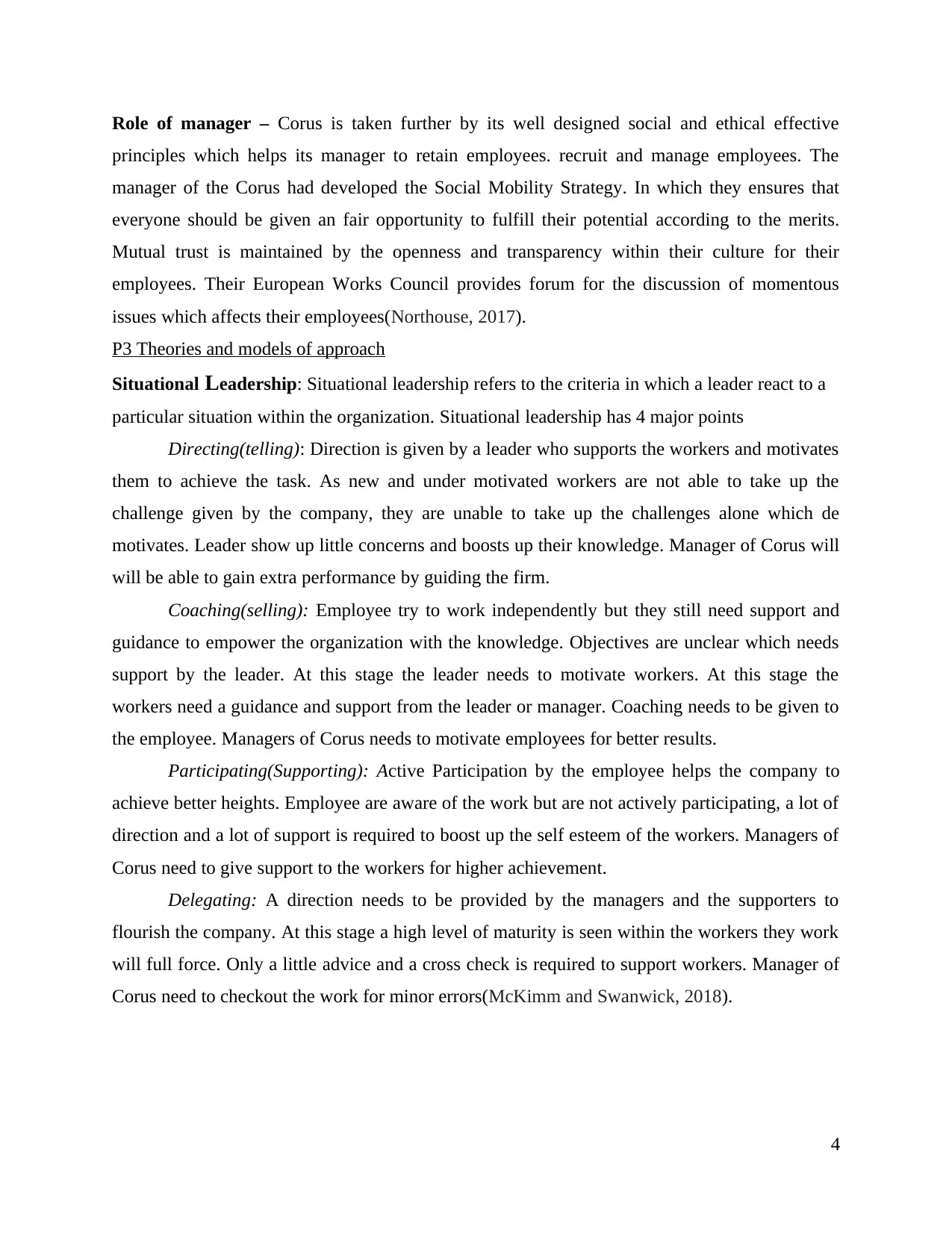
Role of manager – Corus is taken further by its well designed social and ethical effective
principles which helps its manager to retain employees. recruit and manage employees. The
manager of the Corus had developed the Social Mobility Strategy. In which they ensures that
everyone should be given an fair opportunity to fulfill their potential according to the merits.
Mutual trust is maintained by the openness and transparency within their culture for their
employees. Their European Works Council provides forum for the discussion of momentous
issues which affects their employees(Northouse, 2017).
P3 Theories and models of approach
Situational Leadership: Situational leadership refers to the criteria in which a leader react to a
particular situation within the organization. Situational leadership has 4 major points
Directing(telling): Direction is given by a leader who supports the workers and motivates
them to achieve the task. As new and under motivated workers are not able to take up the
challenge given by the company, they are unable to take up the challenges alone which de
motivates. Leader show up little concerns and boosts up their knowledge. Manager of Corus will
will be able to gain extra performance by guiding the firm.
Coaching(selling): Employee try to work independently but they still need support and
guidance to empower the organization with the knowledge. Objectives are unclear which needs
support by the leader. At this stage the leader needs to motivate workers. At this stage the
workers need a guidance and support from the leader or manager. Coaching needs to be given to
the employee. Managers of Corus needs to motivate employees for better results.
Participating(Supporting): Active Participation by the employee helps the company to
achieve better heights. Employee are aware of the work but are not actively participating, a lot of
direction and a lot of support is required to boost up the self esteem of the workers. Managers of
Corus need to give support to the workers for higher achievement.
Delegating: A direction needs to be provided by the managers and the supporters to
flourish the company. At this stage a high level of maturity is seen within the workers they work
will full force. Only a little advice and a cross check is required to support workers. Manager of
Corus need to checkout the work for minor errors(McKimm and Swanwick, 2018).
4
principles which helps its manager to retain employees. recruit and manage employees. The
manager of the Corus had developed the Social Mobility Strategy. In which they ensures that
everyone should be given an fair opportunity to fulfill their potential according to the merits.
Mutual trust is maintained by the openness and transparency within their culture for their
employees. Their European Works Council provides forum for the discussion of momentous
issues which affects their employees(Northouse, 2017).
P3 Theories and models of approach
Situational Leadership: Situational leadership refers to the criteria in which a leader react to a
particular situation within the organization. Situational leadership has 4 major points
Directing(telling): Direction is given by a leader who supports the workers and motivates
them to achieve the task. As new and under motivated workers are not able to take up the
challenge given by the company, they are unable to take up the challenges alone which de
motivates. Leader show up little concerns and boosts up their knowledge. Manager of Corus will
will be able to gain extra performance by guiding the firm.
Coaching(selling): Employee try to work independently but they still need support and
guidance to empower the organization with the knowledge. Objectives are unclear which needs
support by the leader. At this stage the leader needs to motivate workers. At this stage the
workers need a guidance and support from the leader or manager. Coaching needs to be given to
the employee. Managers of Corus needs to motivate employees for better results.
Participating(Supporting): Active Participation by the employee helps the company to
achieve better heights. Employee are aware of the work but are not actively participating, a lot of
direction and a lot of support is required to boost up the self esteem of the workers. Managers of
Corus need to give support to the workers for higher achievement.
Delegating: A direction needs to be provided by the managers and the supporters to
flourish the company. At this stage a high level of maturity is seen within the workers they work
will full force. Only a little advice and a cross check is required to support workers. Manager of
Corus need to checkout the work for minor errors(McKimm and Swanwick, 2018).
4
⊘ This is a preview!⊘
Do you want full access?
Subscribe today to unlock all pages.

Trusted by 1+ million students worldwide
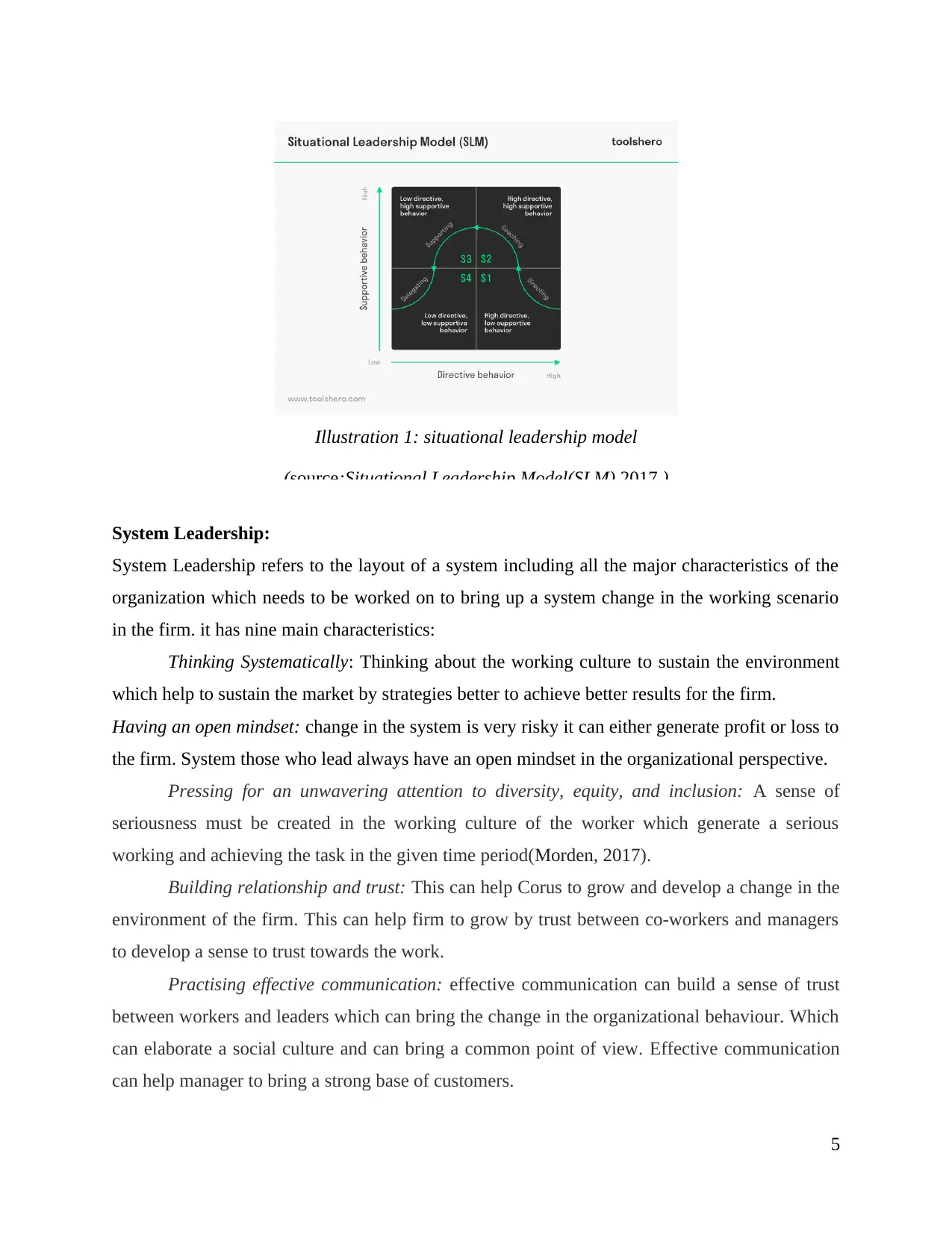
System Leadership:
System Leadership refers to the layout of a system including all the major characteristics of the
organization which needs to be worked on to bring up a system change in the working scenario
in the firm. it has nine main characteristics:
Thinking Systematically: Thinking about the working culture to sustain the environment
which help to sustain the market by strategies better to achieve better results for the firm.
Having an open mindset: change in the system is very risky it can either generate profit or loss to
the firm. System those who lead always have an open mindset in the organizational perspective.
Pressing for an unwavering attention to diversity, equity, and inclusion: A sense of
seriousness must be created in the working culture of the worker which generate a serious
working and achieving the task in the given time period(Morden, 2017).
Building relationship and trust: This can help Corus to grow and develop a change in the
environment of the firm. This can help firm to grow by trust between co-workers and managers
to develop a sense to trust towards the work.
Practising effective communication: effective communication can build a sense of trust
between workers and leaders which can bring the change in the organizational behaviour. Which
can elaborate a social culture and can bring a common point of view. Effective communication
can help manager to bring a strong base of customers.
5
Illustration 1: situational leadership model
(source:Situational Leadership Model(SLM),2017 )
System Leadership refers to the layout of a system including all the major characteristics of the
organization which needs to be worked on to bring up a system change in the working scenario
in the firm. it has nine main characteristics:
Thinking Systematically: Thinking about the working culture to sustain the environment
which help to sustain the market by strategies better to achieve better results for the firm.
Having an open mindset: change in the system is very risky it can either generate profit or loss to
the firm. System those who lead always have an open mindset in the organizational perspective.
Pressing for an unwavering attention to diversity, equity, and inclusion: A sense of
seriousness must be created in the working culture of the worker which generate a serious
working and achieving the task in the given time period(Morden, 2017).
Building relationship and trust: This can help Corus to grow and develop a change in the
environment of the firm. This can help firm to grow by trust between co-workers and managers
to develop a sense to trust towards the work.
Practising effective communication: effective communication can build a sense of trust
between workers and leaders which can bring the change in the organizational behaviour. Which
can elaborate a social culture and can bring a common point of view. Effective communication
can help manager to bring a strong base of customers.
5
Illustration 1: situational leadership model
(source:Situational Leadership Model(SLM),2017 )
Paraphrase This Document
Need a fresh take? Get an instant paraphrase of this document with our AI Paraphraser
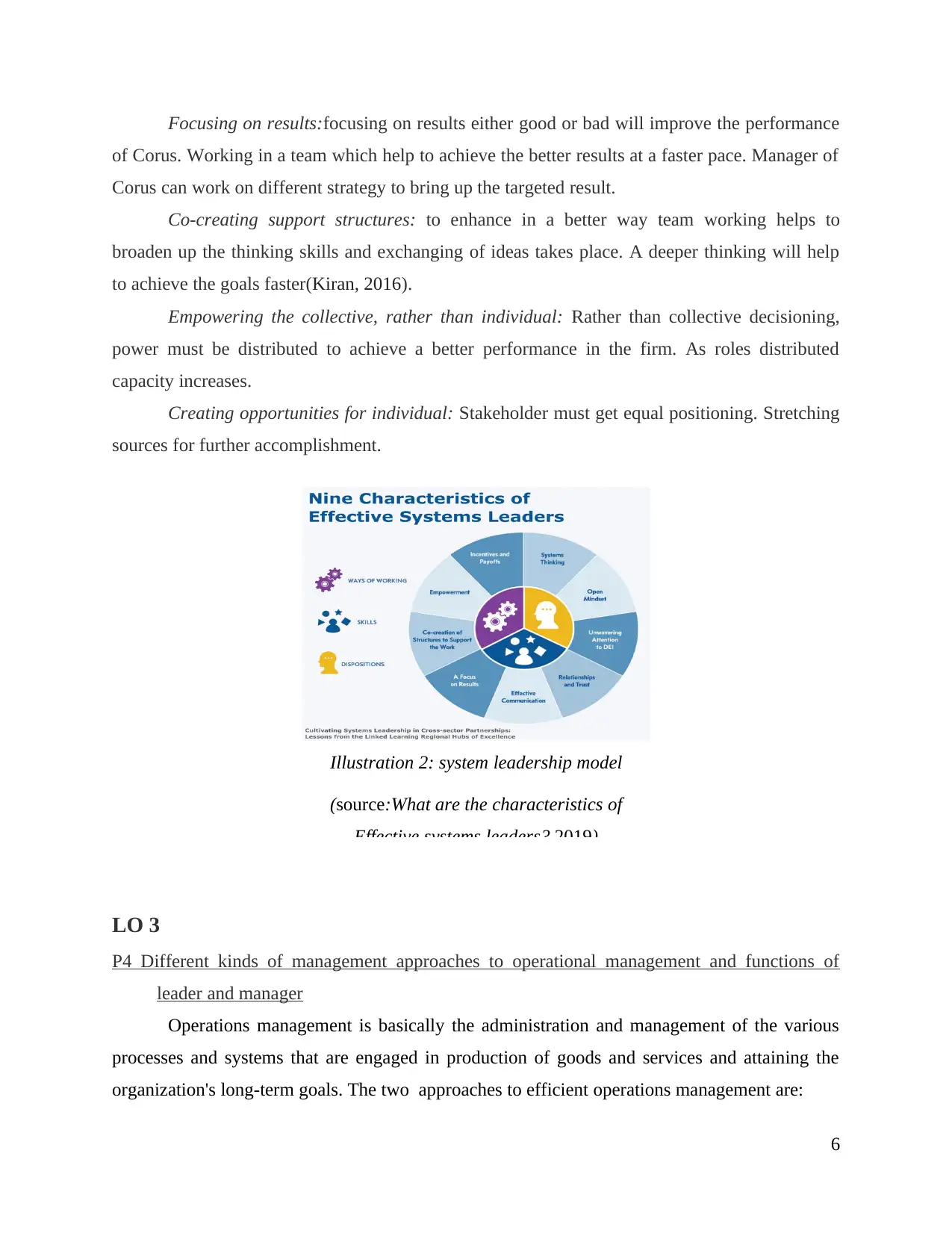
Focusing on results:focusing on results either good or bad will improve the performance
of Corus. Working in a team which help to achieve the better results at a faster pace. Manager of
Corus can work on different strategy to bring up the targeted result.
Co-creating support structures: to enhance in a better way team working helps to
broaden up the thinking skills and exchanging of ideas takes place. A deeper thinking will help
to achieve the goals faster(Kiran, 2016).
Empowering the collective, rather than individual: Rather than collective decisioning,
power must be distributed to achieve a better performance in the firm. As roles distributed
capacity increases.
Creating opportunities for individual: Stakeholder must get equal positioning. Stretching
sources for further accomplishment.
LO 3
P4 Different kinds of management approaches to operational management and functions of
leader and manager
Operations management is basically the administration and management of the various
processes and systems that are engaged in production of goods and services and attaining the
organization's long-term goals. The two approaches to efficient operations management are:
6
Illustration 2: system leadership model
(source:What are the characteristics of
Effective systems leaders?,2019)
of Corus. Working in a team which help to achieve the better results at a faster pace. Manager of
Corus can work on different strategy to bring up the targeted result.
Co-creating support structures: to enhance in a better way team working helps to
broaden up the thinking skills and exchanging of ideas takes place. A deeper thinking will help
to achieve the goals faster(Kiran, 2016).
Empowering the collective, rather than individual: Rather than collective decisioning,
power must be distributed to achieve a better performance in the firm. As roles distributed
capacity increases.
Creating opportunities for individual: Stakeholder must get equal positioning. Stretching
sources for further accomplishment.
LO 3
P4 Different kinds of management approaches to operational management and functions of
leader and manager
Operations management is basically the administration and management of the various
processes and systems that are engaged in production of goods and services and attaining the
organization's long-term goals. The two approaches to efficient operations management are:
6
Illustration 2: system leadership model
(source:What are the characteristics of
Effective systems leaders?,2019)
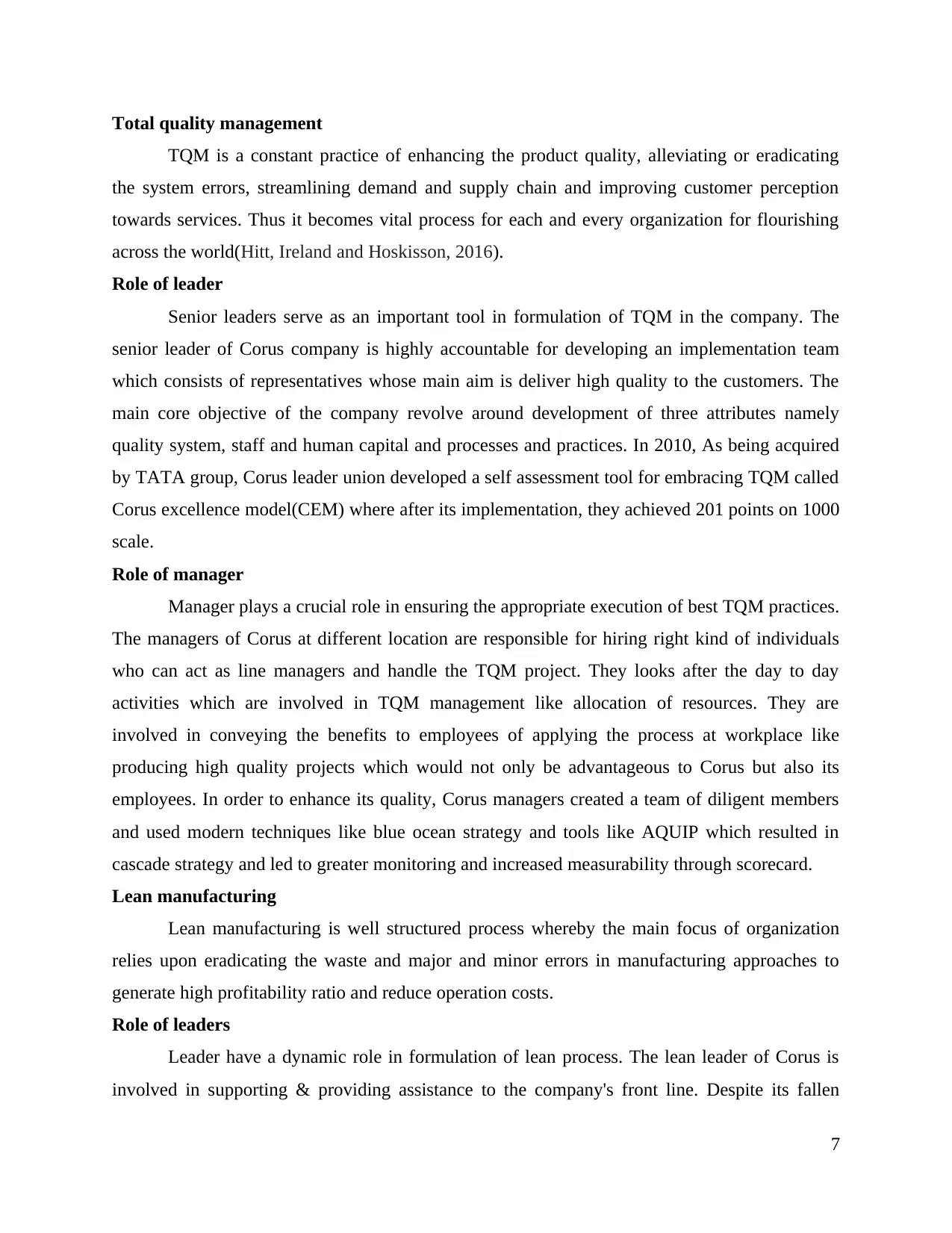
Total quality management
TQM is a constant practice of enhancing the product quality, alleviating or eradicating
the system errors, streamlining demand and supply chain and improving customer perception
towards services. Thus it becomes vital process for each and every organization for flourishing
across the world(Hitt, Ireland and Hoskisson, 2016).
Role of leader
Senior leaders serve as an important tool in formulation of TQM in the company. The
senior leader of Corus company is highly accountable for developing an implementation team
which consists of representatives whose main aim is deliver high quality to the customers. The
main core objective of the company revolve around development of three attributes namely
quality system, staff and human capital and processes and practices. In 2010, As being acquired
by TATA group, Corus leader union developed a self assessment tool for embracing TQM called
Corus excellence model(CEM) where after its implementation, they achieved 201 points on 1000
scale.
Role of manager
Manager plays a crucial role in ensuring the appropriate execution of best TQM practices.
The managers of Corus at different location are responsible for hiring right kind of individuals
who can act as line managers and handle the TQM project. They looks after the day to day
activities which are involved in TQM management like allocation of resources. They are
involved in conveying the benefits to employees of applying the process at workplace like
producing high quality projects which would not only be advantageous to Corus but also its
employees. In order to enhance its quality, Corus managers created a team of diligent members
and used modern techniques like blue ocean strategy and tools like AQUIP which resulted in
cascade strategy and led to greater monitoring and increased measurability through scorecard.
Lean manufacturing
Lean manufacturing is well structured process whereby the main focus of organization
relies upon eradicating the waste and major and minor errors in manufacturing approaches to
generate high profitability ratio and reduce operation costs.
Role of leaders
Leader have a dynamic role in formulation of lean process. The lean leader of Corus is
involved in supporting & providing assistance to the company's front line. Despite its fallen
7
TQM is a constant practice of enhancing the product quality, alleviating or eradicating
the system errors, streamlining demand and supply chain and improving customer perception
towards services. Thus it becomes vital process for each and every organization for flourishing
across the world(Hitt, Ireland and Hoskisson, 2016).
Role of leader
Senior leaders serve as an important tool in formulation of TQM in the company. The
senior leader of Corus company is highly accountable for developing an implementation team
which consists of representatives whose main aim is deliver high quality to the customers. The
main core objective of the company revolve around development of three attributes namely
quality system, staff and human capital and processes and practices. In 2010, As being acquired
by TATA group, Corus leader union developed a self assessment tool for embracing TQM called
Corus excellence model(CEM) where after its implementation, they achieved 201 points on 1000
scale.
Role of manager
Manager plays a crucial role in ensuring the appropriate execution of best TQM practices.
The managers of Corus at different location are responsible for hiring right kind of individuals
who can act as line managers and handle the TQM project. They looks after the day to day
activities which are involved in TQM management like allocation of resources. They are
involved in conveying the benefits to employees of applying the process at workplace like
producing high quality projects which would not only be advantageous to Corus but also its
employees. In order to enhance its quality, Corus managers created a team of diligent members
and used modern techniques like blue ocean strategy and tools like AQUIP which resulted in
cascade strategy and led to greater monitoring and increased measurability through scorecard.
Lean manufacturing
Lean manufacturing is well structured process whereby the main focus of organization
relies upon eradicating the waste and major and minor errors in manufacturing approaches to
generate high profitability ratio and reduce operation costs.
Role of leaders
Leader have a dynamic role in formulation of lean process. The lean leader of Corus is
involved in supporting & providing assistance to the company's front line. Despite its fallen
7
⊘ This is a preview!⊘
Do you want full access?
Subscribe today to unlock all pages.

Trusted by 1+ million students worldwide
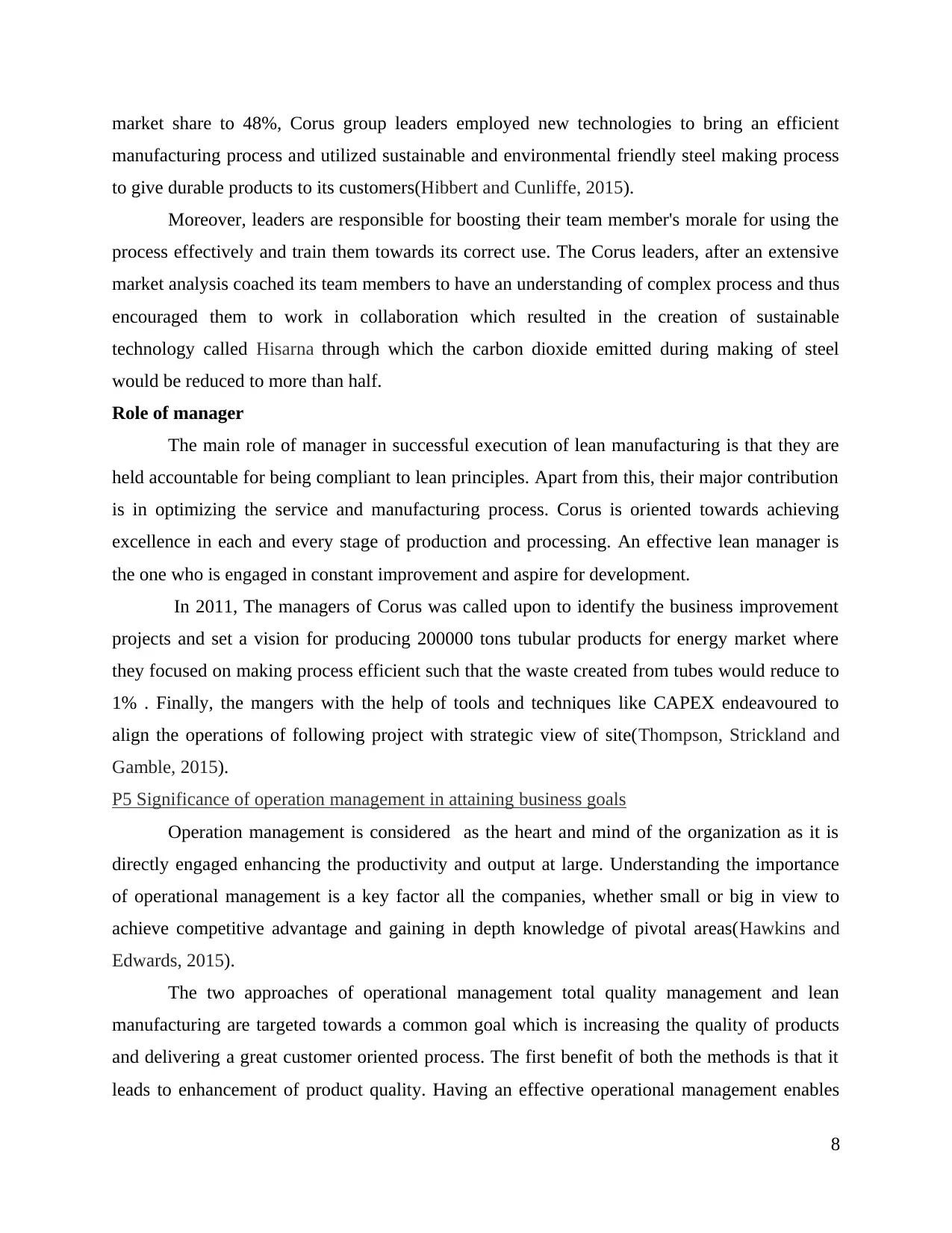
market share to 48%, Corus group leaders employed new technologies to bring an efficient
manufacturing process and utilized sustainable and environmental friendly steel making process
to give durable products to its customers(Hibbert and Cunliffe, 2015).
Moreover, leaders are responsible for boosting their team member's morale for using the
process effectively and train them towards its correct use. The Corus leaders, after an extensive
market analysis coached its team members to have an understanding of complex process and thus
encouraged them to work in collaboration which resulted in the creation of sustainable
technology called Hisarna through which the carbon dioxide emitted during making of steel
would be reduced to more than half.
Role of manager
The main role of manager in successful execution of lean manufacturing is that they are
held accountable for being compliant to lean principles. Apart from this, their major contribution
is in optimizing the service and manufacturing process. Corus is oriented towards achieving
excellence in each and every stage of production and processing. An effective lean manager is
the one who is engaged in constant improvement and aspire for development.
In 2011, The managers of Corus was called upon to identify the business improvement
projects and set a vision for producing 200000 tons tubular products for energy market where
they focused on making process efficient such that the waste created from tubes would reduce to
1% . Finally, the mangers with the help of tools and techniques like CAPEX endeavoured to
align the operations of following project with strategic view of site(Thompson, Strickland and
Gamble, 2015).
P5 Significance of operation management in attaining business goals
Operation management is considered as the heart and mind of the organization as it is
directly engaged enhancing the productivity and output at large. Understanding the importance
of operational management is a key factor all the companies, whether small or big in view to
achieve competitive advantage and gaining in depth knowledge of pivotal areas(Hawkins and
Edwards, 2015).
The two approaches of operational management total quality management and lean
manufacturing are targeted towards a common goal which is increasing the quality of products
and delivering a great customer oriented process. The first benefit of both the methods is that it
leads to enhancement of product quality. Having an effective operational management enables
8
manufacturing process and utilized sustainable and environmental friendly steel making process
to give durable products to its customers(Hibbert and Cunliffe, 2015).
Moreover, leaders are responsible for boosting their team member's morale for using the
process effectively and train them towards its correct use. The Corus leaders, after an extensive
market analysis coached its team members to have an understanding of complex process and thus
encouraged them to work in collaboration which resulted in the creation of sustainable
technology called Hisarna through which the carbon dioxide emitted during making of steel
would be reduced to more than half.
Role of manager
The main role of manager in successful execution of lean manufacturing is that they are
held accountable for being compliant to lean principles. Apart from this, their major contribution
is in optimizing the service and manufacturing process. Corus is oriented towards achieving
excellence in each and every stage of production and processing. An effective lean manager is
the one who is engaged in constant improvement and aspire for development.
In 2011, The managers of Corus was called upon to identify the business improvement
projects and set a vision for producing 200000 tons tubular products for energy market where
they focused on making process efficient such that the waste created from tubes would reduce to
1% . Finally, the mangers with the help of tools and techniques like CAPEX endeavoured to
align the operations of following project with strategic view of site(Thompson, Strickland and
Gamble, 2015).
P5 Significance of operation management in attaining business goals
Operation management is considered as the heart and mind of the organization as it is
directly engaged enhancing the productivity and output at large. Understanding the importance
of operational management is a key factor all the companies, whether small or big in view to
achieve competitive advantage and gaining in depth knowledge of pivotal areas(Hawkins and
Edwards, 2015).
The two approaches of operational management total quality management and lean
manufacturing are targeted towards a common goal which is increasing the quality of products
and delivering a great customer oriented process. The first benefit of both the methods is that it
leads to enhancement of product quality. Having an effective operational management enables
8
Paraphrase This Document
Need a fresh take? Get an instant paraphrase of this document with our AI Paraphraser
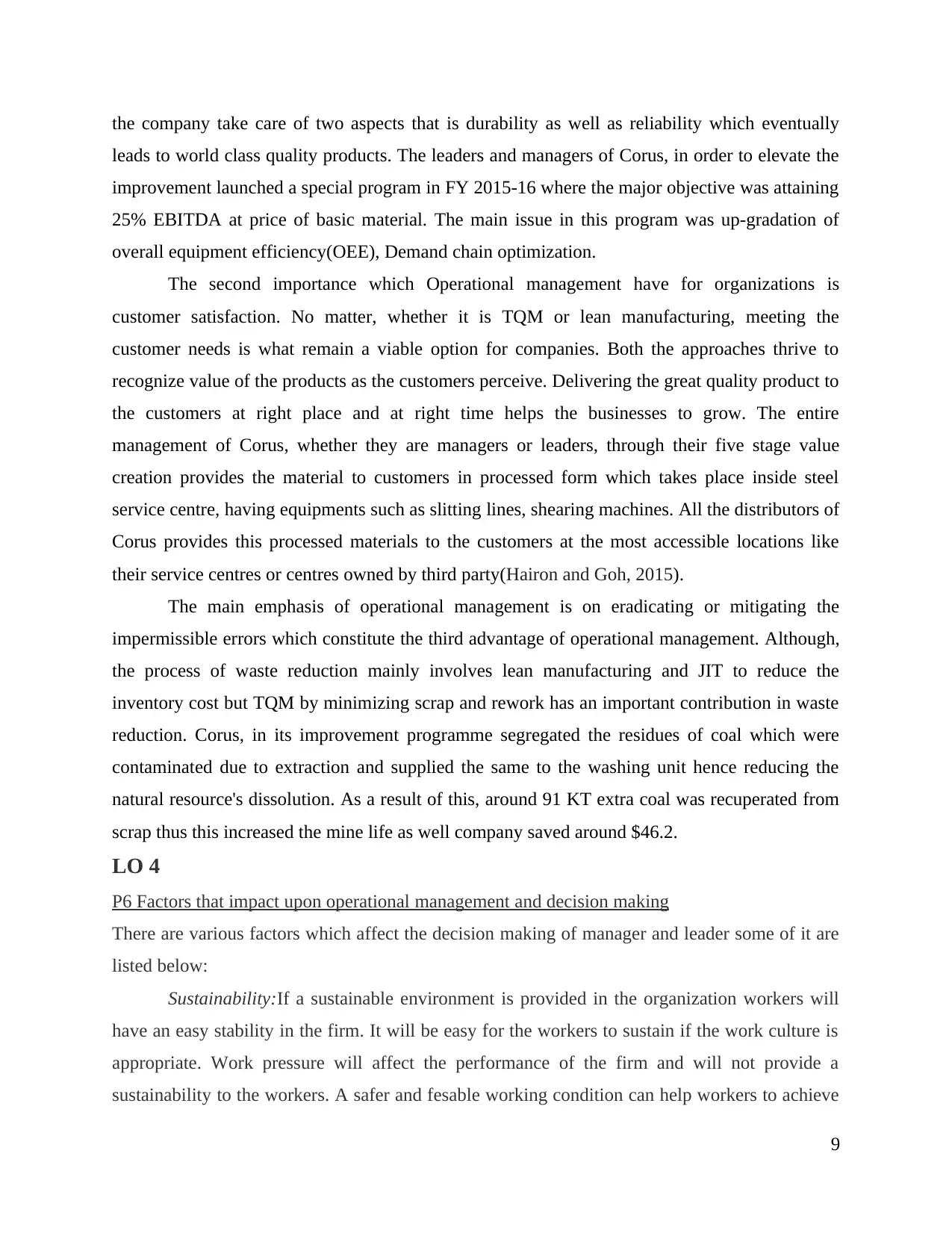
the company take care of two aspects that is durability as well as reliability which eventually
leads to world class quality products. The leaders and managers of Corus, in order to elevate the
improvement launched a special program in FY 2015-16 where the major objective was attaining
25% EBITDA at price of basic material. The main issue in this program was up-gradation of
overall equipment efficiency(OEE), Demand chain optimization.
The second importance which Operational management have for organizations is
customer satisfaction. No matter, whether it is TQM or lean manufacturing, meeting the
customer needs is what remain a viable option for companies. Both the approaches thrive to
recognize value of the products as the customers perceive. Delivering the great quality product to
the customers at right place and at right time helps the businesses to grow. The entire
management of Corus, whether they are managers or leaders, through their five stage value
creation provides the material to customers in processed form which takes place inside steel
service centre, having equipments such as slitting lines, shearing machines. All the distributors of
Corus provides this processed materials to the customers at the most accessible locations like
their service centres or centres owned by third party(Hairon and Goh, 2015).
The main emphasis of operational management is on eradicating or mitigating the
impermissible errors which constitute the third advantage of operational management. Although,
the process of waste reduction mainly involves lean manufacturing and JIT to reduce the
inventory cost but TQM by minimizing scrap and rework has an important contribution in waste
reduction. Corus, in its improvement programme segregated the residues of coal which were
contaminated due to extraction and supplied the same to the washing unit hence reducing the
natural resource's dissolution. As a result of this, around 91 KT extra coal was recuperated from
scrap thus this increased the mine life as well company saved around $46.2.
LO 4
P6 Factors that impact upon operational management and decision making
There are various factors which affect the decision making of manager and leader some of it are
listed below:
Sustainability:If a sustainable environment is provided in the organization workers will
have an easy stability in the firm. It will be easy for the workers to sustain if the work culture is
appropriate. Work pressure will affect the performance of the firm and will not provide a
sustainability to the workers. A safer and fesable working condition can help workers to achieve
9
leads to world class quality products. The leaders and managers of Corus, in order to elevate the
improvement launched a special program in FY 2015-16 where the major objective was attaining
25% EBITDA at price of basic material. The main issue in this program was up-gradation of
overall equipment efficiency(OEE), Demand chain optimization.
The second importance which Operational management have for organizations is
customer satisfaction. No matter, whether it is TQM or lean manufacturing, meeting the
customer needs is what remain a viable option for companies. Both the approaches thrive to
recognize value of the products as the customers perceive. Delivering the great quality product to
the customers at right place and at right time helps the businesses to grow. The entire
management of Corus, whether they are managers or leaders, through their five stage value
creation provides the material to customers in processed form which takes place inside steel
service centre, having equipments such as slitting lines, shearing machines. All the distributors of
Corus provides this processed materials to the customers at the most accessible locations like
their service centres or centres owned by third party(Hairon and Goh, 2015).
The main emphasis of operational management is on eradicating or mitigating the
impermissible errors which constitute the third advantage of operational management. Although,
the process of waste reduction mainly involves lean manufacturing and JIT to reduce the
inventory cost but TQM by minimizing scrap and rework has an important contribution in waste
reduction. Corus, in its improvement programme segregated the residues of coal which were
contaminated due to extraction and supplied the same to the washing unit hence reducing the
natural resource's dissolution. As a result of this, around 91 KT extra coal was recuperated from
scrap thus this increased the mine life as well company saved around $46.2.
LO 4
P6 Factors that impact upon operational management and decision making
There are various factors which affect the decision making of manager and leader some of it are
listed below:
Sustainability:If a sustainable environment is provided in the organization workers will
have an easy stability in the firm. It will be easy for the workers to sustain if the work culture is
appropriate. Work pressure will affect the performance of the firm and will not provide a
sustainability to the workers. A safer and fesable working condition can help workers to achieve
9
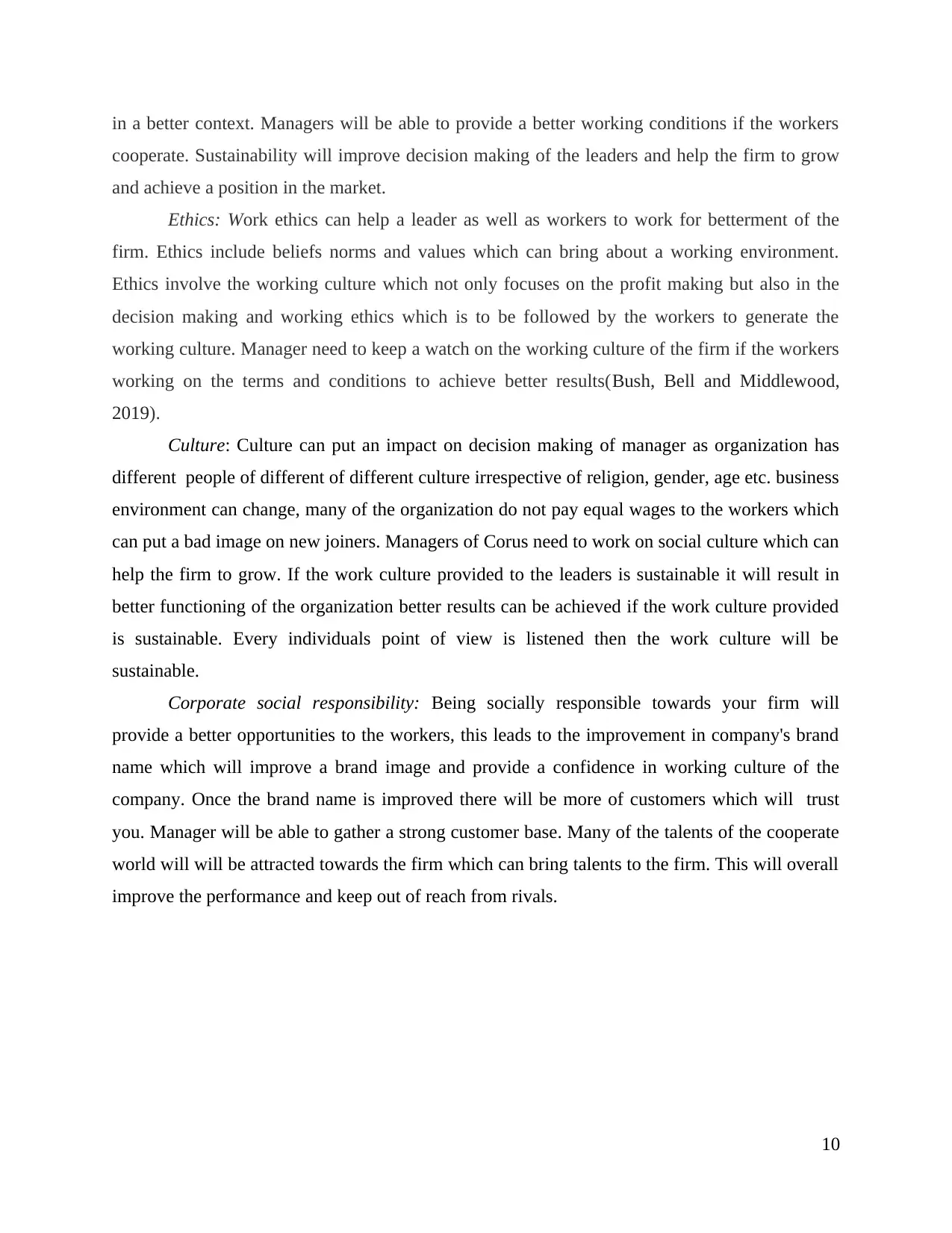
in a better context. Managers will be able to provide a better working conditions if the workers
cooperate. Sustainability will improve decision making of the leaders and help the firm to grow
and achieve a position in the market.
Ethics: Work ethics can help a leader as well as workers to work for betterment of the
firm. Ethics include beliefs norms and values which can bring about a working environment.
Ethics involve the working culture which not only focuses on the profit making but also in the
decision making and working ethics which is to be followed by the workers to generate the
working culture. Manager need to keep a watch on the working culture of the firm if the workers
working on the terms and conditions to achieve better results(Bush, Bell and Middlewood,
2019).
Culture: Culture can put an impact on decision making of manager as organization has
different people of different of different culture irrespective of religion, gender, age etc. business
environment can change, many of the organization do not pay equal wages to the workers which
can put a bad image on new joiners. Managers of Corus need to work on social culture which can
help the firm to grow. If the work culture provided to the leaders is sustainable it will result in
better functioning of the organization better results can be achieved if the work culture provided
is sustainable. Every individuals point of view is listened then the work culture will be
sustainable.
Corporate social responsibility: Being socially responsible towards your firm will
provide a better opportunities to the workers, this leads to the improvement in company's brand
name which will improve a brand image and provide a confidence in working culture of the
company. Once the brand name is improved there will be more of customers which will trust
you. Manager will be able to gather a strong customer base. Many of the talents of the cooperate
world will will be attracted towards the firm which can bring talents to the firm. This will overall
improve the performance and keep out of reach from rivals.
10
cooperate. Sustainability will improve decision making of the leaders and help the firm to grow
and achieve a position in the market.
Ethics: Work ethics can help a leader as well as workers to work for betterment of the
firm. Ethics include beliefs norms and values which can bring about a working environment.
Ethics involve the working culture which not only focuses on the profit making but also in the
decision making and working ethics which is to be followed by the workers to generate the
working culture. Manager need to keep a watch on the working culture of the firm if the workers
working on the terms and conditions to achieve better results(Bush, Bell and Middlewood,
2019).
Culture: Culture can put an impact on decision making of manager as organization has
different people of different of different culture irrespective of religion, gender, age etc. business
environment can change, many of the organization do not pay equal wages to the workers which
can put a bad image on new joiners. Managers of Corus need to work on social culture which can
help the firm to grow. If the work culture provided to the leaders is sustainable it will result in
better functioning of the organization better results can be achieved if the work culture provided
is sustainable. Every individuals point of view is listened then the work culture will be
sustainable.
Corporate social responsibility: Being socially responsible towards your firm will
provide a better opportunities to the workers, this leads to the improvement in company's brand
name which will improve a brand image and provide a confidence in working culture of the
company. Once the brand name is improved there will be more of customers which will trust
you. Manager will be able to gather a strong customer base. Many of the talents of the cooperate
world will will be attracted towards the firm which can bring talents to the firm. This will overall
improve the performance and keep out of reach from rivals.
10
⊘ This is a preview!⊘
Do you want full access?
Subscribe today to unlock all pages.

Trusted by 1+ million students worldwide
1 out of 14
Related Documents
Your All-in-One AI-Powered Toolkit for Academic Success.
+13062052269
info@desklib.com
Available 24*7 on WhatsApp / Email
![[object Object]](/_next/static/media/star-bottom.7253800d.svg)
Unlock your academic potential
Copyright © 2020–2026 A2Z Services. All Rights Reserved. Developed and managed by ZUCOL.





